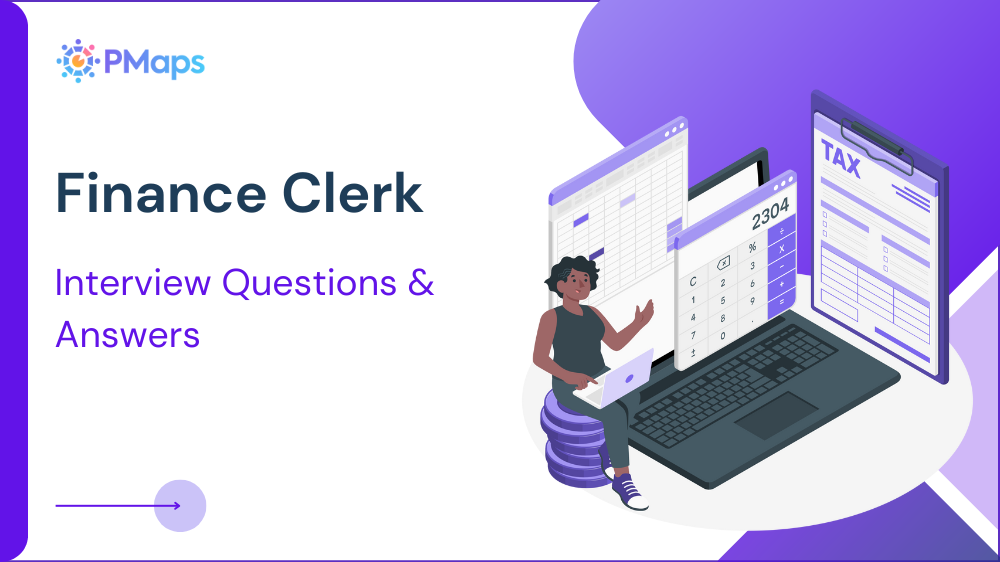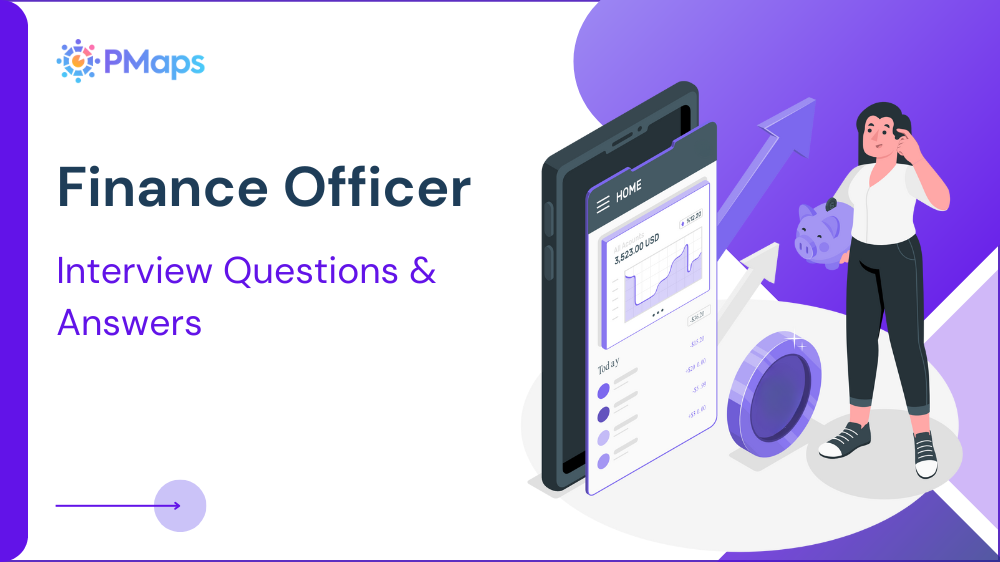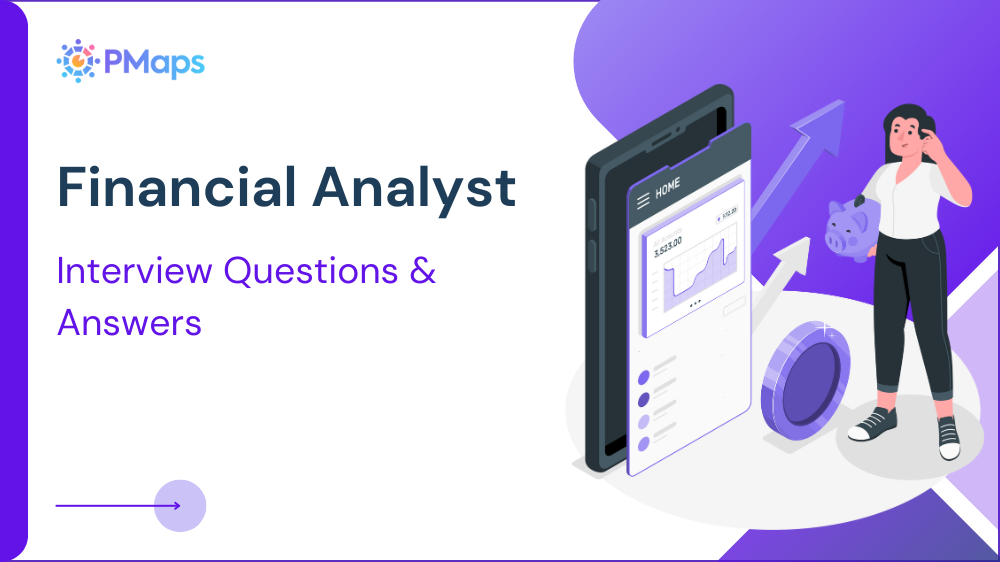
Finance clerk interview questions are essential for evaluating a candidate’s ability to manage financial records, process transactions, and maintain organizational financial integrity. A finance clerk plays a crucial role in ensuring that financial processes run smoothly, from accounts payable to financial reporting.
This guide provides comprehensive finance clerk interview questions and answers, covering general, behavioral, situational, and technical areas. Each question is designed to help hiring managers assess candidates' technical knowledge, problem-solving abilities, and attention to detail—key qualities for a successful finance clerk.
General Interview Questions for Finance Clerk
General finance clerk interview questions are designed to assess a candidate’s understanding of accounting principles, financial record-keeping, and transaction processing. These finance clerk questions and answers help determine whether the candidate can handle the daily responsibilities of a finance clerk, such as managing financial data, reconciling accounts, and processing payments accurately. Questions for finance clerk interview roles also evaluate communication skills, attention to detail, and organizational capabilities.
1. Can you explain the key responsibilities of a finance clerk?
- What it assesses:
Understanding of the role and the scope of responsibilities. - What to listen for:
Knowledge of financial record-keeping, transaction processing, and administrative duties. - Sample ideal answer:
“A finance clerk is responsible for maintaining accurate financial records, processing invoices, managing accounts payable and receivable, preparing financial reports, and ensuring compliance with financial regulations and internal policies.”
2. How do you prioritize tasks when you have multiple deadlines?
- What it assesses:
Time management and organizational skills. - What to listen for:
Methods for managing multiple tasks without sacrificing accuracy or deadlines. - Sample ideal answer:
“I use a priority-based approach, first addressing time-sensitive tasks such as processing urgent payments. I also make sure to break down larger tasks into smaller, manageable steps, ensuring deadlines are met while maintaining accuracy.”
3. How do you ensure accuracy when processing financial transactions?
- What it assesses:
Attention to detail and accuracy in financial record-keeping. - What to listen for:
Techniques for minimizing errors and ensuring that transactions are correct. - Sample ideal answer:
“I double-check every entry for accuracy before finalizing the transaction. I also reconcile financial records regularly to catch any discrepancies early on. Additionally, I use financial software to track and verify transactions systematically.”
4. What experience do you have with accounting software or financial systems?
- What it assesses:
Technical proficiency with accounting tools and financial systems. - What to listen for:
Familiarity with accounting software, ERP systems, or any tools used in financial operations. - Sample ideal answer:
“I have worked extensively with QuickBooks and Microsoft Excel for financial data entry and reporting. I am also familiar with ERP systems like SAP, and I’m comfortable learning new software quickly as needed.”
5. How do you handle discrepancies in financial reports or accounts?
- What it assesses:
Problem-solving skills and attention to accuracy. - What to listen for:
Approach to identifying, resolving, and preventing discrepancies. - Sample ideal answer:
“I begin by reviewing the records carefully to identify where the discrepancy occurred. I compare documents and check for any missed entries or duplicate transactions. Once identified, I take corrective action and document the adjustments for future reference.”
Behavioral Interview Questions for Finance Clerk
Behavioral finance clerk interview questions and answers explore how candidates have handled specific challenges in past roles. These finance clerk behavioral questions help assess a candidate’s problem-solving abilities, attention to detail, and communication skills, which are essential for success in a finance clerk role.
1. Tell me about a time when you had to deal with a difficult financial discrepancy.
- What it assesses:
Problem-solving, attention to detail, and persistence. - What to listen for:
Ability to investigate the issue, take corrective action, and ensure it doesn’t happen again. - Sample ideal answer:
“I once noticed a discrepancy in an invoice that didn’t match the payment records. I reviewed the supporting documentation, identified the source of the issue, and communicated with the vendor. I then updated our records and implemented a system to prevent similar errors in the future.”
2. Describe a situation where you had to meet a tight deadline while ensuring accuracy.
- What it assesses:
Time management and ability to work under pressure. - What to listen for:
Strategies used to manage time, prioritize tasks, and maintain accuracy. - Sample ideal answer:
“During month-end reporting, I had a tight deadline to process all transactions. I prioritized urgent tasks and broke down the report into manageable steps. I stayed focused and completed the report on time without sacrificing accuracy, ensuring all data was double-checked before submission.”
3. Give an example of when you identified an error in financial documents and how you corrected it.
- What it assesses:
Attention to detail and problem-solving. - What to listen for:
Steps taken to identify the mistake and the method for correcting it. - Sample ideal answer:
“I noticed an overpayment in one of the accounts while reconciling. I immediately flagged the issue, traced the error to a duplicate entry, and corrected the account. I then updated the records and informed the relevant team members to ensure the error was not repeated.”
4. Tell me about a time when you had to handle multiple financial tasks simultaneously. How did you manage it?
- What it assesses:
Multitasking, organizational skills, and efficiency. - What to listen for:
Ability to prioritize tasks, maintain focus, and stay organized. - Sample ideal answer:
“I often have to juggle multiple tasks, such as processing invoices, preparing financial reports, and reconciling accounts. I prioritize tasks based on urgency, use spreadsheets to stay organized, and ensure that I complete each task with the required accuracy.”
5. Can you share an experience when you had to collaborate with another department to resolve a financial issue?
- What it assesses:
Collaboration, communication, and cross-departmental problem-solving. - What to listen for:
Examples of teamwork and clear communication to resolve issues. - Sample ideal answer:
“I once worked with the procurement department to resolve discrepancies between our accounts payable and received invoices. We identified that the issue was due to a miscommunication in purchase order details. After clarifying the details, we updated the system to prevent further issues and streamlined the process.”
Situational Interview Questions for Finance Clerk
Situational finance clerk interview questions are designed to assess how candidates would respond to real-world challenges they might encounter in the role. These finance clerk scenario-based questions help hiring managers evaluate problem-solving skills, decision-making, and the ability to handle situations while maintaining accuracy and compliance.
1. How would you handle a situation where you are asked to process an urgent payment, but the invoice is missing some required documentation?
- What it assesses:
Decision-making, attention to detail, and compliance. - What to listen for:
Approach to resolving the issue while following company procedures and maintaining accuracy. - Sample ideal answer:
“I would first reach out to the vendor to obtain the missing documentation. If I can’t reach them in time, I would inform my supervisor and suggest processing the payment once the required documentation is received to ensure compliance.”
2. Imagine you discover a duplicate payment in the accounting system. How would you address this situation?
- What it assesses:
Problem-solving, attention to detail, and corrective actions. - What to listen for:
Steps taken to identify, report, and correct the mistake. - Sample ideal answer:
“I would first verify the duplicate payment by reviewing the transaction records. Then, I would correct the error in the system, notify the supervisor, and contact the vendor for reimbursement. I would also review our processes to ensure this doesn’t happen in the future.”
3. How would you respond if you’re asked to update financial records by a deadline, but you discover discrepancies in the data?
- What it assesses:
Integrity, problem-solving, and time management. - What to listen for:
Ability to prioritize the issue and ensure accuracy under time constraints. - Sample ideal answer:
“I would immediately address the discrepancies by reviewing the source documents and identifying the root cause. I’d prioritize resolving the discrepancies and ensure that the final records are accurate before meeting the deadline. If I need extra time or help, I would notify my supervisor promptly.”
4. How would you handle a situation where a customer or client questions a charge on their account, and the details are unclear in the system?
- What it assesses:
Customer service, problem-solving, and communication skills. - What to listen for:
Steps taken to clarify the charge, communicate with the customer, and resolve the issue. - Sample ideal answer:
“I would first review the account details and transaction history to gather more information. If I cannot find a clear explanation, I would contact the appropriate department or vendor for clarification. I would then communicate the findings to the customer in a clear and polite manner, offering a solution if necessary.”
Technical / Role-Specific Interview Questions for Finance Clerk
Technical finance clerk interview questions assess a candidate’s ability to handle financial transactions, manage accounts, and use accounting software accurately. These finance clerk role-specific questions ensure that the candidate has the necessary technical skills and experience to perform the core tasks required in the role.
1. What accounting software have you used, and how proficient are you with it?
- What it assesses:
Technical proficiency with accounting tools and software. - What to listen for:
Experience with software commonly used in finance and accounting departments, such as QuickBooks, Excel, or SAP. - Sample ideal answer:
“I have experience with QuickBooks and Microsoft Excel for financial reporting, data entry, and reconciliation. I am also familiar with SAP for managing accounts payable and receivable. I am confident in my ability to quickly learn new software as needed.”
2. How do you ensure accurate data entry and record-keeping in your daily tasks?
- What it assesses:
Accuracy, attention to detail, and organizational skills. - What to listen for:
Strategies for ensuring the integrity of financial data and minimizing errors. - Sample ideal answer:
“I double-check all data before entering it into the system and use standardized templates for reporting to avoid inconsistencies. I also regularly review records and reconcile accounts to ensure everything matches and is accurately recorded.”
3. How do you handle financial reconciliations, and what is your process for identifying discrepancies?
- What it assesses:
Knowledge of reconciliation procedures and problem-solving skills. - What to listen for:
A methodical approach to reconciling accounts and resolving discrepancies. - Sample ideal answer:
“I start by comparing bank statements with internal records to identify discrepancies. I then review transaction details, check supporting documents, and collaborate with relevant departments if needed. Once the discrepancy is identified, I correct the entry and ensure accurate records are maintained.”
4. What steps do you take to prepare financial statements and reports?
- What it assesses:
Ability to generate financial reports and summarize key financial data. - What to listen for:
Understanding of reporting requirements and process for creating accurate statements. - Sample ideal answer:
“I gather financial data from various sources, ensure all entries are updated, and then prepare monthly or quarterly reports based on that data. I verify the accuracy of the statements, analyze financial trends, and present the findings to management.”
5. How do you manage accounts payable and receivable efficiently?
- What it assesses:
Efficiency in managing transactions and maintaining cash flow. - What to listen for:
Familiarity with handling accounts, tracking outstanding payments, and following up on overdue amounts. - Sample ideal answer:
“I use accounting software to track accounts payable and receivable, ensuring that invoices are paid on time and overdue payments are followed up promptly. I also maintain communication with vendors and customers to resolve any issues and avoid delays in payments.”
For a full overview of responsibilities and requirements, refer to our Finance Clerk Job Description.
Pro Tips for Interviewing Finance Clerks
While finance clerk interview questions evaluate a candidate’s technical expertise and problem-solving abilities, it's important to also assess their organizational skills, attention to detail, and ability to work in a fast-paced environment. Here are some practical finance clerk interview tips to help hiring managers make more informed decisions:
Assess attention to detail:
Finance clerks must handle financial transactions and records with a high degree of accuracy. Include questions that assess how candidates ensure error-free data entry, manage financial records, and handle discrepancies.
Evaluate their understanding of financial software:
Since finance clerks rely heavily on accounting software and tools, assess the candidate’s proficiency with relevant platforms such as QuickBooks, Microsoft Excel, or other financial management software.
Test organizational and time management skills:
Finance clerks often juggle multiple tasks and deadlines. Ask situational questions that highlight their ability to prioritize tasks and manage time effectively, especially during peak times such as month-end or year-end closing.
Explore their communication skills:
Effective communication is key when dealing with clients, vendors, and colleagues. Ask questions that assess how they handle interactions, whether it’s for processing payments, resolving discrepancies, or discussing financial matters with team members.
Use assessments to validate technical skills:
Pair interviews with a structured Finance Clerk Test to validate practical knowledge, data entry accuracy, and financial process understanding. This ensures that candidates have the necessary skills before making a final decision.
Conclusion
A structured set of finance clerk interview questions allows hiring managers to evaluate a candidate’s technical knowledge, accuracy, attention to detail, and ability to manage financial processes efficiently. By combining general, behavioral, situational, and technical questions, you can assess a candidate’s overall suitability for the finance clerk role.









